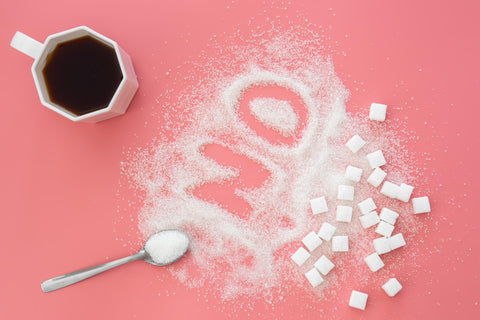Calcium is an essential nutrient and an alkaline mineral. One of the most apparent of its functions is maintaining the health and strength of bones and teeth. More than 90% of body Calcium is stored in these two structures. It is also one of the main components of hair, and nails. Only 1 percent of it is stored in other body tissues. It means we should avoid accumulating it in other parts of the body.
It is used to control levels of magnesium, potassium, and phosphorus in the blood. As a matter of fact, all these minerals work together to balance one another. This is one of the reasons why it is so important to ensure the right intake of each one of them and maintain a proper balance between them.
Deficiency Risk Factors
One of the reasons of Calcium deficiency is that our body pulls this nutrient from our bones when our diet does not include enough of it. It also happens when our diet is too high in animal protein (especially dairy products) and when we regularly use stimulants such as caffeine.
Animal protein and caffeine create very acidic environment. Therefore, to make it less acidic and more alkaline, the body uses Calcium stored in the bones thus leading to its deficiency and weakening the bones.
Most common deficiency symptoms may include the following:
- Brittle and weak bones
- Delayed growth and development in children
- Problems with blood clotting
- Muscle spasms and cramps
- Tiredness and weakness
- Irritability
- Problems associated with high blood pressure (hypertension)
- Irregular heartbeat, increased risk of heart failure, various types of arrythmia, and supraventricular tachycardia
Health Benefits of Calcium

Bone Health
Bones are the main storage site of Calcium in the body. Our body cannot make this mineral. It can only get it from the food we eat, or from supplements. If we do not get enough of it in our diet, and if we do not absorb enough of this mineral, our bones can get weak or will not grow properly.
Calcium increases bone density and reduces the prevalence of osteoporosis. About 80% of people with bone fractures had insufficient daily intake of it (1).
Muscles
It prevents our muscles from being either underactive or overactive (from going into spasms). Similar problem can be caused by the deficiency of Magnesium and Vitamin D.
Not only deficiency but also excess may cause muscles to contract too much. For this reason, Calcium supplements should always be taken with Magnesium and Vitamin D3.
Heartburn
Calcium combined with Magnesium can help reduce heartburn because these two minerals help address two key causes of this problem.
First, they help lower stomach acidity. Secondly, they are also required for the lower oesophageal sphincter muscle to close properly and prevent stomach acid from entering the oesophagus. Therefore, taking these two minerals in the form of supplements improves this muscle function and can often help reverse the symptoms associated with acid reflux (1).
Nerve Impulses
Convulsive seizures and inability to transmit electrical impulses may be contributed by Calcium deficiency. This is so because it helps release neurotransmitters in the brain that control nerve signalling and muscle movements. It activates certain proteins that are required by muscles to move and contract.
It also helps with the control and release of the blood glucose which is the key fuel used by the brain cells, nerve cells, and muscles (1).
Irregular Heartbeat
Since it is required for proper muscle function and nerve transmission, it plays an important role in regulation of the heartbeat. Its deficiency, therefore, may lead to irregular heartbeat (1).
PMS
It can be useful in relieving PMS symptoms, including cramps, headaches, mood swings, muscle aches, and fatigue (2).
During menstrual cycle oestrogen levels increase, causing Calcium concentrations to drop. For this reason, taking a Calcium supplement may help reduce these symptoms.
Blood Pressure
Calcium, especially when combined with Magnesium, is an ideal blood pressure supplement and help improve blood pressure readings.
It is involved in supporting normal blood pressure because of its role in dilating blood vessels and sending nerve signals from the brain to the heart.
It has been shown to help lower high blood pressure, whereas insufficient levels of this mineral tend to elevate blood pressure (3).
Weight Management
It may help lose weight by improving appetite control and fat metabolism (4). This effect is more pronounced when it is combined with supplemental Vitamin D intake. Together they help decrease hunger and increase fat oxidation and excretion after meals (5).
Diabetes
Calcium and Vitamin D support pancreatic cells that control insulin secretion and therefore promote healthy blood sugar levels.
Blood Clotting
Like the deficiency of Vitamin K, low Calcium in the blood can also lead to the inability of the blood to clot.
Cancer
It is important in the process called apoptosis which leads to the death of abnormal cells in the body. In this way it helps prevent these cells from becoming cancer cells.
Every time a cell divides, it is supposed to pause and check the health of its DNA. If the DNA is damaged, it tries to repair it. And if it cannot be repaired, Calcium helps to trigger the “suicidal” apoptosis process during which the abnormal cell dies.
Its deficiency is believed to be one of the causes why the apoptosis process is not efficient enough.
There is a significant association between Calcium and Vitamin D intake and reduced risk of death from various types of cancers (6).
300 mg of Calcium intake per day was associated with an approximately 8% reduced risk of colon cancer (7, 8).
Food Sources of Calcium
Dairy products (milk, cheese, yogurt, etc.) are always mentioned as the best source of Calcium. Unfortunately, as explained below, due to high content of animal protein, dairy products contribute to the deficiency of this mineral and poor bone health. Much better dietary source of this mineral are vegetables (especially leafy greens), sesame seeds, legumes, and grains (such as amaranth).
Animal Protein and Bone Health
The key cause of leeching Calcium from our bones seems to be the high consumption of animal protein (meat, fish, milk, and dairy products).
In the effort to digest animal protein, our body produces sulfuric acid, thus creating a very acidic environment. To reduce this excessive acidity, the body uses Calcium stored in bones contributing to their weakness.
That is why the prevalence of osteoporosis and rates of hip fractures are highest in countries such as USA, Sweden, Norway, New Zealand, or Australia, where dairy consumption is also the highest in the world.
Also, the rates of osteoporosis-related bone fractures among Eskimo women, whose diet is very high in animal protein, are one of the highest of all population groups.
On the other hand, people living in rural regions of Asia and Africa whose diet is based on unrefined plant foods and the consumption of animal protein is very low, have the lowest rates of osteoporosis and hip fractures.
For example, the African Bantu women consume no dairy products and their daily calcium intake, which comes from plant sources, is only about 300 mg. As a result, all of them including even the oldest women, are free from osteoporosis and other degenerative diseases.
A diet based on the plant protein doesn’t seem to have such negative effect due to different amino acid ratio compared to the animal protein.
Unlike rich in protein plant foods, such as legumes, the animal protein is high in sulphur compounds which create acid during digestion leading to acidosis. As a result, our body tries to address the excessive acidity using Calcium phosphate stored in the bones. Unfortunately, in this way it makes the bones weaker.
It means that by consuming milk and dairy products, people are losing more Calcium than they ingest, resulting in the negative balance of this mineral.
Absorption
Human body absorbs Calcium much better when it is combined with Vitamin D3, Magnesium, Phosphorous, and Vitamin K.
Vitamin D is necessary for proper Calcium transport and metabolism. Many people simply aren’t getting enough of Vitamin D unless they take at least 3000-5000 IU daily.
Another problem is that many individuals take Vitamin D3 supplements without Magnesium which is required for the activation of Vitamin D3 in the body. Without enough Magnesium, Vitamin D3 is stored in the body but can’t be used.
There is also evidence that Calcium metabolism and our ability to absorb it declines very substantially if we don’t have enough vitamin C.
Supplemental Forms

Calcium Citrate is the calcium salt of citric acid. Calcium is best absorbed in an acidic environment, so citrate (a chelate) seems to be the best absorbed supplemental form of this mineral as it does not require extra stomach acid for absorption.
It usually provides less elemental calcium (21%) per dose than Calcium carbonate, but it is organic and more usable. 500 mg provides approximately 100 mg of elemental (absorbable) Calcium.
However, if you suffer from acid stomach, it is probably better to avoid this form.
Calcium Gluconate - another organic form but contains lower levels of elemental Calcium than carbonate or citrate.
Calcium Lactate - another organic form which is a combination of Calcium carbonate and lactic acid. It is commonly used as an antacid. Unfortunately, it contains a low amount of elemental Calcium. For this reason, you would need to take more of it to meet the requirements.
Calcium Ascorbate (such as HealthAid Esterfied) – refers to vitamin C bound with Calcium. It is an alkaline form of vitamin C which at the same time provides elemental Calcium. It is regarded as an organic form which does not require stomach acid and therefore is also quite bioavailable. This form of vitamin C is recommended especially for people who suffer from heartburn and can’t take ascorbic acid.
Calcium Phosphate - found in milk and less common in dietary supplements due to its low bioavailability.
And Triphosphate (Tricalcium Phosphate) - has lower acid requirements for dissolution and absorption. For this reason, its bioavailability is significantly higher (39 percent of elemental Calcium).
Calcium Carbonate - a common alkaline compound found in some rocks and shells of marine organisms. It requires extra stomach acid for better absorption. For this reason, it should be taken between meals, when there is more acid in the stomach.
500 mg provides 200 mg of elemental Calcium (40%). It is significantly more than citrate form, and it doesn’t require taking as many tablets, but it is an inorganic and inferior type.
Calcium carbonate is a good antacid because it uses up stomach acid. However, if you are not producing excess stomach acid, use citrate.
Dolomite, Bone Meal, Oyster Shell, Coral Calcium - naturally occurring forms but inorganic (high in c. carbonate) and often contain heavy metals including mercury and lead.
Recommended Daily Intake
Adults under 50, need about 1000 mg of Calcium daily. This amount may increase to 1,200 milligrams daily for adults over 50.
Children need between 200–700 milligrams per day depending on age, while teenagers should get about 1,300 mg daily to support their growing bones.

Dosage
The reasonable dose for supplemental Calcium is 500 mg one to two times a day. It should be always taken with Vitamin D3 (2000-5000 IU daily), Magnesium (such as Magnesium Citrate Powder or Magcitra tablets), 150-200 mg twice daily.
Whenever you take supplemental Calcium or Vitamin D3, you should always take Vitamin K2 MK7 (200-500 mcg per day) to prevent calcification of soft tissue and to improve absorption by the bones.
It is not a good idea to take 1000 mg of supplemental Calcium in one sitting as your body can only absorb 500 mg of at a time. It’s best to split the high dose throughout the day.
Interactions With Other Nutrients
Calcium and Phosphorus have a see-saw relationship with each other. When one is high, the other is low. Excessive Phosphorus intake, therefore, leads to Calcium deficiency.
The best Calcium sources should contain less Phosphorus. Green leafy vegetables like kale, turnip greens, and mustard greens are excellent calcium sources as they have three to five times more Calcium than Phosphorus. Sesame seeds and organic Tofu are good sources of both minerals as they have nearly equal amounts of Calcium and Phosphorus.
Beef, pork, and fish, on the other hand, are high in Phosphorus and low in Calcium. Pepsi and carbonated beverages are loaded with sugar and typically may have 40-50 mg of Phosphorus and no Calcium.
Excessive intake of Calcium lead to Magnesium deficiency. That is another reason to always take Magnesium (200 mg twice daily) with Calcium supplements.
Related Articles
- Bone & Joint Conditions – Leading Complaints Among Adults
- How to Strengthen Your Bone Density and Joints
Sources
- https://selfhacked.com/blog/calcium-101/
- https://pubmed.ncbi.nlm.nih.gov/19574172/
- https://pubmed.ncbi.nlm.nih.gov/8588118/
- https://pubmed.ncbi.nlm.nih.gov/22081691/
- https://pubmed.ncbi.nlm.nih.gov/22385576/
- https://pubmed.ncbi.nlm.nih.gov/19667166/
- https://pubmed.ncbi.nlm.nih.gov/24623471/
- https://pubmed.ncbi.nlm.nih.gov/27254743/
Any information or product suggested on this website is not intended to diagnose, treat, cure or prevent any medical condition. Never disregard medical advice or delay in seeking it because of something you have read on this website. Consult your primary healthcare physician before using any supplements or making any changes to your regime.





